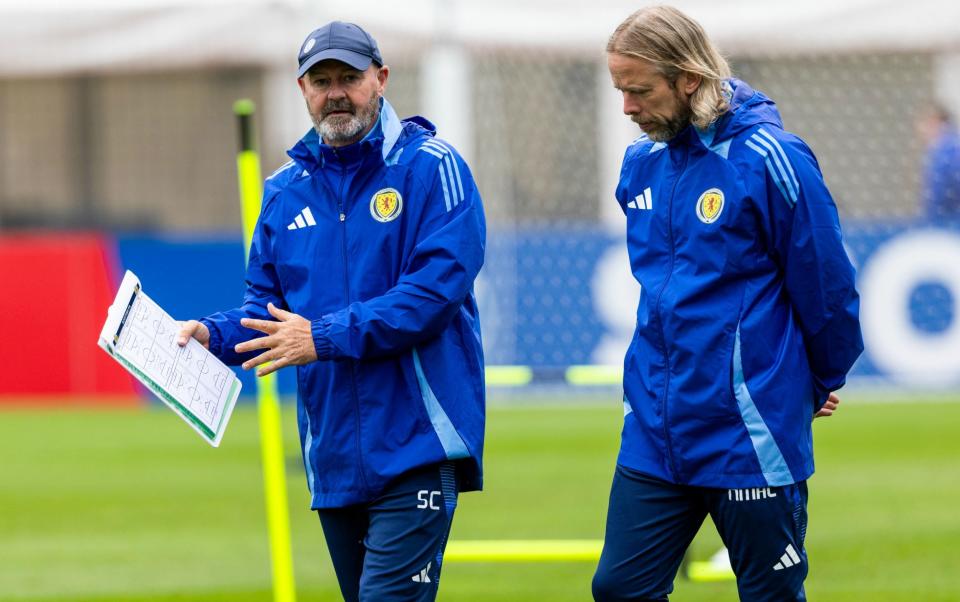Scotland need their set pieces to fire at Euro 2024 – and they have the coach to make it happen

The usual footballing logic would suggest that Scotland’s chances of beating Germany are even thinner than the air at their Garmisch-Partenkirchen training camp, up in the Bavarian alps. Their pre-tournament form has been alarmingly poor, their squad has been ravaged by injuries and their opponents boast some of the best players in Europe.
The usual footballing logic can be awfully boring, though, and no one of a Scottish persuasion has travelled to Munich in expectation of a bland few days. For Scotland, playing in their first overseas tournament since 1998, this is not a time to worry about the form guide or fitness issues. It is instead a moment for dreaming; for expecting the unexpected.
Despite their recent performances – Scotland have won just one of their last nine matches, and that was against Gibraltar – there are reasons to believe they are capable of hurting the host nation. One of those reasons is Austin MacPhee, the man with the longest hair in the Scotland setup and perhaps also the biggest brain.
In the German press, MacPhee has this week been described as “Scotland’s secret weapon”. The locals have evidently become aware of the threat posed by the set-piece coach with the flowing locks, who is regarded within football as one of the game’s leading experts on dead-ball situations.
For Premier League viewers, MacPhee is better known for his work at Aston Villa than for his role on Steve Clarke’s Scotland coaching staff. MacPhee has been Villa’s set-piece specialist since August 2021 and it speaks volumes of his importance at the club that he has survived the sackings of both Dean Smith and Steven Gerrard. Managers have come and gone, but MacPhee and his ever-evolving set-piece routines have remained.
The fuss around MacPhee is not just hype. In all competitions last season, Villa scored 25 goals from set pieces (15 of which came from corners). Across Europe’s top five leagues, only Bayer Leverkusen scored more.
On the international stage, with the help of MacPhee’s coaching, Scotland pose a serious threat from free-kicks and corners. Since his appointment in 2021, around 25 per cent of their goals have been scored from set pieces, or from penalties won at set-piece situations. In their last 14 competitive fixtures, they have scored eight goals from set pieces and conceded only two.
Is one of Scotland’s best hopes against Germany therefore to simply stick it in the mixer? The routines are much more complicated than that in the modern game but, on the most basic level, the answer is probably yes. The likes of John McGinn, Andy Robertson, Kieran Tierney and Ryan Christie are all capable of producing excellent deliveries from wide.
MacPhee’s success and rising profile in recent seasons has helped to make set-piece coaches the latest must-have trend in football. They are so in-demand in the Premier League that clubs are now paying transfer fees for them, as Chelsea did when signing Bernardo Cueva from Brentford for £750,000.

Indeed, these specialists have become so commonplace that managers are now grilled about not having one on their staff, as was the case with Ange Postecoglou at Tottenham Hotspur last season, rather than about the need to employ one.
Of course, no one in football will claim that set pieces are the most attractive part of the game. Most players dread the section of training which is devoted to corners and free-kicks. Ollie Watkins, the Villa striker, admitted earlier this year that MacPhee’s set-piece sessions are “not the most exciting” and “a little bit boring”.
They are absolutely necessary, though, and for Scotland they will present an opportunity in the tournament opener against Germany, as well as in the subsequent matches against Switzerland and Hungary. The ambition is to progress beyond the group stages of a major tournament for the first time, and such a goal will only be achieved if they can excel in all areas of the game.
MacPhee, in contrast to the Scotland players, has personal experience of the knockout stages of a European Championship: he was part of Northern Ireland’s coaching team in 2016, when they reached the round of 16. MacPhee is a proud Scot (born in Kirkcaldy, he attended the 1998 World Cup in France as a teenage fan) and is hoping to repeat that feat in the coming weeks.
The worrying question for him and Clarke is whether Scotland will be able to perform at their best — on set pieces and in open play — without so many important players. Their list of injuries is brutally long, and has perhaps done even more damage to national optimism than their run of concerning results since they lost 3-1 to England in September.
Among those missing are right-backs Aaron Hickey and Nathan Patterson, key forward Lyndon Dykes, young talent Ben Doak and midfielder Lewis Ferguson, who was named the best midfielder in Serie A for his excellent performances at Bologna (Robertson also picked up a knock earlier this week, although Scotland played down fears he could miss the opener).
That is the bad news, then. The good news is that Scotland still have the mighty McGinn, who has so far embraced this tournament with the same gusto he shows on the pitch: when Scotland arrived at their Bavarian base this week, McGinn took part in a traditional folk dance at the local town hall.
The welcome party 🇩🇪
🕺 @jmcginn7 #EURO2024 pic.twitter.com/RUErC8rTRO— Scotland National Team (@ScotlandNT) June 9, 2024
McGinn is a huge character in the squad and is regarded by many as Scotland’s most important player. The 29-year-old has been involved in 11 goals (six goals, five assists) of Scotland’s last 35 in all competitions, and comes into the tournament still riding the high of Champions League qualification with Villa.
With the likes of Billy Gilmour, Scott McTominay, Robertson and Tierney supporting McGinn, Scotland have quality players who can make a difference on the pitch as their German adventure begins. And with MacPhee in their ranks, they might just have a coach who can make a difference with his work off it.

 Yahoo Sport
Yahoo Sport 






































